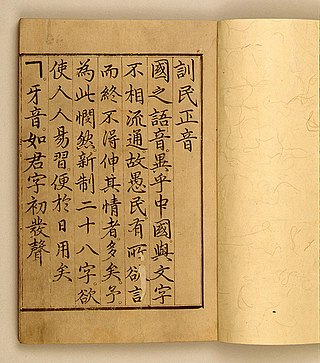
Hunminjeongeum is a 15th century historical document that introduced a script that became the Hangul script for writing the Korean language. An original copy of the document is currently located at the Gansong Art Museum in Seoul, South Korea.

Sejong, personal name Yi Do, commonly known as Sejong the Great, was the fourth monarch of the Joseon dynasty of Korea. Today, he is regarded as one of the greatest rulers in Korean history, and is remembered as the inventor of Hangul, the native alphabet of the Korean language.

Seoul National University is a public research university located in Seoul, South Korea. It is one of the SKY universities and a part of the Flagship Korean National Universities.

Daejeon is South Korea's fifth-largest metropolis, with a population of 1.5 million as of 2019. Located in a central lowland valley alongside forested hills and the Geum River, the city is known for its technology and research institutions, and for celebrating its natural environment, with most mountains, hot springs, and rivers freely open for public use. Daejeon serves as a hub of transportation for major rail and road routes, and is approximately 50 minutes from the capital, Seoul, by KTX or SRT high speed rail.
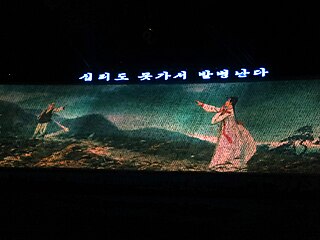
"Arirang" is a Korean folk song. There are about 3,600 variations of 60 different versions of the song, all of which include a refrain similar to "Arirang, arirang, arariyo ". It is estimated the song is more than 600 years old.

Anyang is a city in Gyeonggi Province, South Korea. With a population of approximately 600,000, it is the 20th largest city in South Korea. It is a satellite city of Seoul and located approximately 21 km (13 mi) south of Seoul, and 19 km (12 mi) north of Suwon. It is connected to Seoul via the Seoul Subway Line 1 and Line 4. The City motto of Anyang is "Livable city, Proud citizens". City symbols are a grape mascot named 'Podong-i', Forsythia (flower), Ginkgo (tree), and eagles.

Dankook University, abbreviated as DKU, is a private research university in Yongin and Cheonan, South Korea. The university was established in 1947. It was the first university established after the National Liberation Day of Korea, and its original location was in Jongno District and Yongsan District, Seoul.

Korea University is a private university in Seoul, South Korea. Established in 1905, the university was named after Goguryeo. The university is one of the SKY universities.

Sejong Center for the Performing Arts (Korean: 세종문화회관) is the largest arts and cultural complex in Seoul, South Korea. It has an interior area of 53,202m². It is situated in the center of the capital, on Sejongno, a main road that cuts through the capital city of the Joseon Dynasty. The center took 4 years to complete, opening in 1978. It was "built as a cultural center for Seoulites". It currently contains one of the biggest pipe organs in Asia.

Hongik University is a private university in Seoul, South Korea. Founded by an activist in 1946, the university is located in Mapo-gu district of central Seoul, South Korea with a second campus(branch campus) in Sejong.

Chung Un-chan is a South Korean politician who was the Prime Minister of South Korea (2009–2010). He was a professor of Seoul National University from 1978 to 2009, serving as the president of the university from July 2002 to July 2006 until he was designated to the Prime Minister. He is the current commissioner of the Korea Baseball Organization.
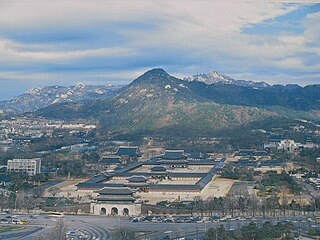
Jongno District is a district in central Seoul, South Korea. It is the historic center of Seoul, and contains the Joseon-era royal palace Gyeongbokgung and the former presidential residence, the Blue House.

Dongdaemun District is one of the 25 districts of Seoul, South Korea.

Gwangjin District is one of the 25 districts of Seoul, South Korea. It is located on the north bank of the Han River on the eastern end of Seoul. The district was split from the neighboring Seongdong District in 1995.
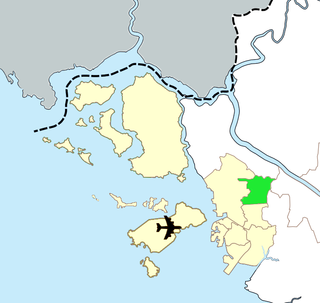
Gyeyang District is a ward in Incheon, South Korea.

Sejong or Sejong City, officially the Sejong Special Self-Governing City, is a special self-governing city and the de facto administrative capital of South Korea.
Korea University (고려대학교) most commonly refers to a private university in South Korea.

Sejong University is a private university located in Seoul, South Korea known for its standing in hospitality and tourism management, dancing, animation and rhythmic gymnastics. Founded as the Kyung Sung Humanities Institute, it was renamed in 1978 to its present name in honor of Sejong the Great, the fourth king of the Joseon Dynasty and overseer of the creation of the Korean alphabet Hangul.
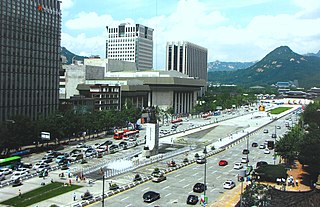
Gwanghwamun Square is a public square on Sejongno, Jongno-gu, Seoul, South Korea. Serving as a public space and at times road for centuries of Korean history, it is also historically significant as the location of royal administrative buildings, known as Yukjo-geori or Street of Six Ministries; and features statues of Admiral Yi Sun-sin of Joseon Dynasty and King Sejong the Great of Joseon.
Jeon Hyeong-pil was a Korean art collector. He is also known by his art name Gansong.

















